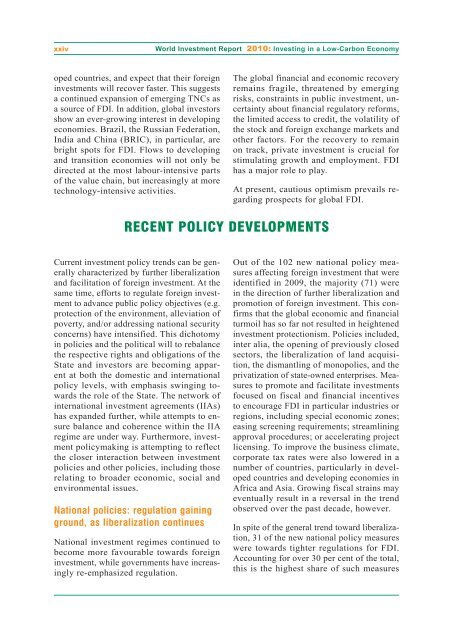UN World Investment Report 2010 - Office of Trade Negotiations
UN World Investment Report 2010 - Office of Trade Negotiations
UN World Investment Report 2010 - Office of Trade Negotiations
You also want an ePaper? Increase the reach of your titles
YUMPU automatically turns print PDFs into web optimized ePapers that Google loves.
xxiv<br />
oped countries, and expect that their foreign<br />
investments will recover faster. This suggests<br />
a continued expansion <strong>of</strong> emerging TNCs as<br />
a source <strong>of</strong> FDI. In addition, global investors<br />
show an ever-growing interest in developing<br />
economies. Brazil, the Russian Federation,<br />
India and China (BRIC), in particular, are<br />
bright spots for FDI. Flows to developing<br />
and transition economies will not only be<br />
directed at the most labour-intensive parts<br />
<strong>of</strong> the value chain, but increasingly at more<br />
technology-intensive activities.<br />
<strong>World</strong> <strong>Investment</strong> <strong>Report</strong> <strong>2010</strong>: Investing in a Low-Carbon Economy<br />
The global financial and economic recovery<br />
remains fragile, threatened by emerging<br />
risks, constraints in public investment, uncertainty<br />
about financial regulatory reforms,<br />
the limited access to credit, the volatility <strong>of</strong><br />
the stock and foreign exchange markets and<br />
other factors. For the recovery to remain<br />
on track, private investment is crucial for<br />
stimulating growth and employment. FDI<br />
has a major role to play.<br />
At present, cautious optimism prevails regarding<br />
prospects for global FDI.<br />
RECENT POLICY DEVELOPMENTS<br />
Current investment policy trends can be generally<br />
characterized by further liberalization<br />
and facilitation <strong>of</strong> foreign investment. At the<br />
same time, efforts to regulate foreign investment<br />
to advance public policy objectives (e.g.<br />
protection <strong>of</strong> the environment, alleviation <strong>of</strong><br />
poverty, and/or addressing national security<br />
concerns) have intensified. This dichotomy<br />
in policies and the political will to rebalance<br />
the respective rights and obligations <strong>of</strong> the<br />
State and investors are becoming apparent<br />
at both the domestic and international<br />
policy levels, with emphasis swinging towards<br />
the role <strong>of</strong> the State. The network <strong>of</strong><br />
international investment agreements (IIAs)<br />
has expanded further, while attempts to ensure<br />
balance and coherence within the IIA<br />
regime are under way. Furthermore, investment<br />
policymaking is attempting to reflect<br />
the closer interaction between investment<br />
policies and other policies, including those<br />
relating to broader economic, social and<br />
environmental issues.<br />
National policies: regulation gaining<br />
ground, as liberalization continues<br />
National investment regimes continued to<br />
become more favourable towards foreign<br />
investment, while governments have increasingly<br />
re-emphasized regulation.<br />
Out <strong>of</strong> the 102 new national policy measures<br />
affecting foreign investment that were<br />
identified in 2009, the majority (71) were<br />
in the direction <strong>of</strong> further liberalization and<br />
promotion <strong>of</strong> foreign investment. This confirms<br />
that the global economic and financial<br />
turmoil has so far not resulted in heightened<br />
investment protectionism. Policies included,<br />
inter alia, the opening <strong>of</strong> previously closed<br />
sectors, the liberalization <strong>of</strong> land acquisition,<br />
the dismantling <strong>of</strong> monopolies, and the<br />
privatization <strong>of</strong> state-owned enterprises. Measures<br />
to promote and facilitate investments<br />
focused on fiscal and financial incentives<br />
to encourage FDI in particular industries or<br />
regions, including special economic zones;<br />
easing screening requirements; streamlining<br />
approval procedures; or accelerating project<br />
licensing. To improve the business climate,<br />
corporate tax rates were also lowered in a<br />
number <strong>of</strong> countries, particularly in developed<br />
countries and developing economies in<br />
Africa and Asia. Growing fiscal strains may<br />
eventually result in a reversal in the trend<br />
observed over the past decade, however.<br />
In spite <strong>of</strong> the general trend toward liberalization,<br />
31 <strong>of</strong> the new national policy measures<br />
were towards tighter regulations for FDI.<br />
Accounting for over 30 per cent <strong>of</strong> the total,<br />
this is the highest share <strong>of</strong> such measures

















